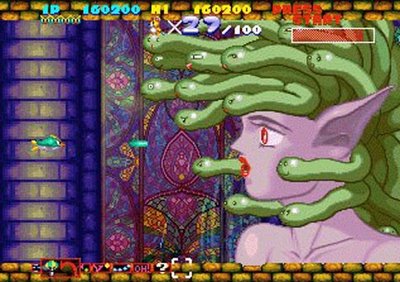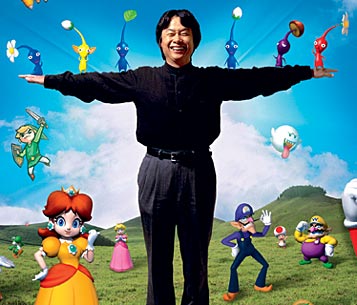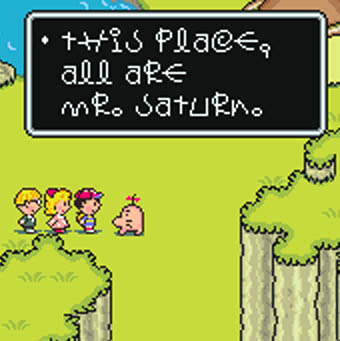Since I first discovered Greek mythology as a kid, I’ve been entranced by it. As a product of Catholic school, I spent a lot of my childhood hearing Biblical stories. In their own right, they’re good, I suppose. Occasionally, they feature the type of extreme violence that grabbed my attention. Greek mythology, however, offered everything: blood, guts, all manner of weird sex, and such freaky monsters that they’re still showing up in random bits of popular culture today.
Easily first among the toothy, mismatched creatures Greek mythology offers us is Medusa. She’s a longtime love of mine. I’ve even written about her before on this blog —
“Fiorenze Henderson” and
“Pentimento” and
“Medusa Meets Monty Python” — but most notably in a post in which I theorized that she could be a symbol for the vilified female artist. Gaze and statues and all that. It makes sense.
Look into it. She’s strange and supremely lethal and quite confusing given her dual origin stories.
 A sketch of Miss M., done during a boring history lecture
A sketch of Miss M., done during a boring history lectureRecently, a fellow blogger wrote
a retrospective of the many appearances of ol’ Snakeylocks in video games. She’s a regular, whether she’s depicted as a vixen with an awkward hairdo or an out-and-out monster. Whatever the design, she’s popular in video games because she’s from Greek mythology — thus her presence doesn’t offend Christians — and she’s a powerful female figure.
Reading the article sent me looking into Medusa. I was surprised to find that her name means “queen” — or, literally, “female ruler” or “female guardian” — in some old form of Greek. How odd. Some postulate that the Medusa character may have arisen from a particularly disliked female ruler whom folklore had transformed into a literal monster by the time the Greeks began telling stories. I, however, would wager that something else may have caused the name “Medusa” to ultimately be associated with the ugliest, the most dangerous and the most genuinely awful woman in the canon of literature. (Yes Jezebel and Lady MacBeth were bad, but people could at least look at them without dying.)
Before I ended up completing the English degree I started college pursuing, I bounced around in a few different departments. I took four linguistics classes with Arthur Schwartz, a great professor who helped me get more out of the language I grew up speaking than anybody else who’s ever taught me. One of the things that has long stood out in my head is the phenomenon of words for “left” becoming pejorative over time. For example, look at the following words for “right” from various Indo-European languages.
- Latin: dexter
- Italian: destra
- German: recht
- French: droite
- Spanish: derecho
- Persian: rast
If you’ll notice, a sound pattern is shared by these words. They either start with “d” or “r,” and most of them have both the “d” and “r” syllables in them. Clearly, these words share an etymological connection. And this would make sense, especially since they refer to a basic human concept and the various listed languages all originate in the same basic area.
Now note the same languages’ words for “left.”
- Latin: sinister
- Italian: mancino
- German: link
- French: gauche
- Spanish: izquierda
- Persian: chap
The relationship among these words vanishes. It might initially seem curious that the words for “left” wouldn’t share a connection with their respective opposites do. However, as Prof. Schwartz explained, another basic human concept is the profanity of the left hand. That side of the body — and especially that hand — is considered so dirty, in fact, that the centuries and centuries of using it eventually makes it impolite to use, similar in the way that “sinister” today means “evil” in English. Thus, before people began writing words down, they’d cycle through words for this idea fairly quickly. Even now that language is more formalized, we’re still doing it. The American expression “left-handed compliment” helps prove this.
This post, however, concerns Medusa. Using the logic of the eventual debasement of words for “left,” I’d wager something similar happened with Medusa. Just as the longstanding view of western culture regards the left hand as the inferior of the right, women, unfortunately, have long been regarded as the inferiors to men. I think that because of this prejudice, words referring to women also suffer the same fate.
I can think of a few examples in contemporary English-speaking culture. Another bit I learned in one of Schwartz’s classes is that a little-known word exists that is a perfect homonym for “queen.” It’s “quean,” which is sometimes spelled “kwean” or “kween,” depending on who’s doing the translating. Now obsolete, “quean” refers to women of little status — nobodies, serfs and the like. The Scots still use it this way. Outside of Scotland, however, the word can also refer to a prostitute or even a male homosexual, the latter of which is made all the more confusing by the fact that we use the more familiarly spelled “queen” today to also mean a male homosexual. The whole essence of what I’m going for here is that queens and queans could easily be considered social opposites. And I find it very interesting that a language would allow for two words with identical pronunciation to mean opposites.
Though it’s probably the best example, we have a few terms we use commonly that work in a similar way. The word “madam,” for example, should be a term of respect, but I know I can’t hear it without hearing the meaning that refers to women in charge of brothels. Likewise, “lady” should be the respectful way one refers to a woman of standing, but to call a woman that — as in, “Listen, lady” — is often considered impolite. A “princess” is more commonly understood as a spoiled girl than the Diana or Cinderella types. “Mary,” long the most common girls' name in the United States, is now a commonly understood term for a male homosexual, which doesn't carry as much perjorative weight today, sure, but did when the term first originated. And then there's “spinster,” “mistress,” “witch,” “bitch,” and “actress” as opposed to “actor.” Even the title “Miss” is now considered improper.
It happens. Words take on new meaning over time, and unless they refer to what their speakers consider good, those meanings often turn out to be bad. I can only imagine that “Medusa” — being an old, old word — has slowly transformed into from a female ruler to the single worst female entity you’d ever want to encounter.
I just enjoy that this monster has roots in something far different. In Sexual Personae, Camille Paglia writes that Medusa is an inherently sexual character. “She is Medusa, in whom Freud sees the castrating and castrated female pubes. But Medusa's snaky hair is also the writhing vegetable growth of nature. Her hideous grimace is men's fear of the laughter of women.” I think she makes a point. And I also think that whether people process the notion of Medusa’s origins or not, they’re aware of her dual nature on some level.
To go back to the Medusa-in-video games post, why else might this loathsome woman come to be represented as beautiful?

Nothing is more interesting than when it’s something and that things opposite at the same time. Does that even make sense?







